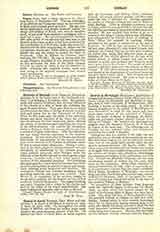

Conrad of Ascoli, BLESSED, Friar Minor and missionary, b. at Ascoli in the March of Ancona in 1234; d. there, April 19, 1289. He belonged to the noble family of Milliano and from his earliest years made penance the predominating element of his life. He entered the Order of Friars Minor at Ascoli together with his townsman and lifelong friend, Girolamo d’Ascoli, afterwards minister general, and later pope under the title of Nicholas IV. Having completed his studies at Perugia, Conrad was sent to Rome to teach theology. Later he obtained permission to go to Africa, where he preached with much fruit through the different provinces of Libya and worked numerous miracles. He was recalled from Africa to go on a mission to the King of France, then at war with Spain, and subsequently he became lector of theology at Paris. When not engaged in teaching, Conrad preached to the people or ministered to the sick in hospitals. In 1288 he was summoned to Rome by the new pope, Nicholas IV, who wished to make him cardinal, but Conrad died on the way after reaching his native city, being then fifty-five years of age. Nicholas IV was deeply grieved at the loss of his saintly friend, on whose counsel and zeal he had counted so much, and declared that Conrad’s death was a great loss to the Church. The people of Ascoli erected a splendid tomb over the remains of Blessed Conrad. In 1371, when his body was removed to the new church of the Franciscans, it was found incorrupt and gave forth a sweet odor. Pius VI approved the cultus of Blessed Conrad. His feast is kept in the Order of Friars Minor on April 19.
STEPHEN M. DONOVAN

